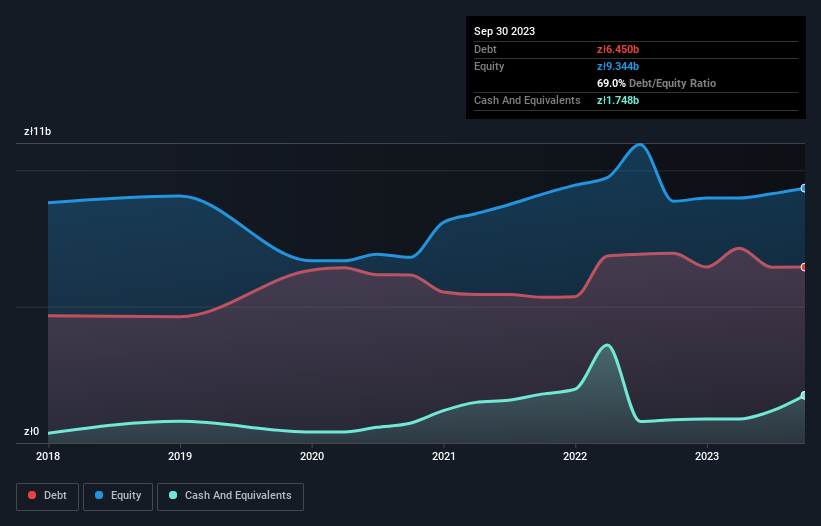Is Allegro.eu (WSE:ALE) Using Too Much Debt?

Legendary fund manager Li Lu (who Charlie Munger backed) once said, 'The biggest investment risk is not the volatility of prices, but whether you will suffer a permanent loss of capital.' When we think about how risky a company is, we always like to look at its use of debt, since debt overload can lead to ruin. Importantly, Allegro.eu SA (WSE:ALE) does carry debt. But the real question is whether this debt is making the company risky.
When Is Debt Dangerous?
Generally speaking, debt only becomes a real problem when a company can't easily pay it off, either by raising capital or with its own cash flow. In the worst case scenario, a company can go bankrupt if it cannot pay its creditors. However, a more common (but still painful) scenario is that it has to raise new equity capital at a low price, thus permanently diluting shareholders. Of course, the upside of debt is that it often represents cheap capital, especially when it replaces dilution in a company with the ability to reinvest at high rates of return. The first thing to do when considering how much debt a business uses is to look at its cash and debt together.
Check out our latest analysis for Allegro.eu
What Is Allegro.eu's Debt?
As you can see below, Allegro.eu had zł6.45b of debt at September 2023, down from zł6.95b a year prior. On the flip side, it has zł1.75b in cash leading to net debt of about zł4.70b.

How Healthy Is Allegro.eu's Balance Sheet?
The latest balance sheet data shows that Allegro.eu had liabilities of zł1.98b due within a year, and liabilities of zł7.80b falling due after that. On the other hand, it had cash of zł1.75b and zł1.36b worth of receivables due within a year. So its liabilities total zł6.67b more than the combination of its cash and short-term receivables.
While this might seem like a lot, it is not so bad since Allegro.eu has a market capitalization of zł32.6b, and so it could probably strengthen its balance sheet by raising capital if it needed to. But we definitely want to keep our eyes open to indications that its debt is bringing too much risk. There's no doubt that we learn most about debt from the balance sheet. But it is future earnings, more than anything, that will determine Allegro.eu's ability to maintain a healthy balance sheet going forward. So if you're focused on the future you can check out this free report showing analyst profit forecasts.
Over 12 months, Allegro.eu reported revenue of zł10b, which is a gain of 36%, although it did not report any earnings before interest and tax. With any luck the company will be able to grow its way to profitability.
Caveat Emptor
While we can certainly appreciate Allegro.eu's revenue growth, its earnings before interest and tax (EBIT) loss is not ideal. Indeed, it lost zł2.5b at the EBIT level. Considering that alongside the liabilities mentioned above does not give us much confidence that company should be using so much debt. Quite frankly we think the balance sheet is far from match-fit, although it could be improved with time. On the bright side, we note that trailing twelve month EBIT is worse than the free cash flow of zł2.0b and the profit of zł697m. So if we focus on those metrics there seems to be a chance the company will manage its debt without much trouble. When analysing debt levels, the balance sheet is the obvious place to start. But ultimately, every company can contain risks that exist outside of the balance sheet. For example, we've discovered 2 warning signs for Allegro.eu that you should be aware of before investing here.
Of course, if you're the type of investor who prefers buying stocks without the burden of debt, then don't hesitate to discover our exclusive list of net cash growth stocks, today.
New: Manage All Your Stock Portfolios in One Place
We've created the ultimate portfolio companion for stock investors, and it's free.
• Connect an unlimited number of Portfolios and see your total in one currency
• Be alerted to new Warning Signs or Risks via email or mobile
• Track the Fair Value of your stocks
Have feedback on this article? Concerned about the content? Get in touch with us directly. Alternatively, email editorial-team (at) simplywallst.com.
This article by Simply Wall St is general in nature. We provide commentary based on historical data and analyst forecasts only using an unbiased methodology and our articles are not intended to be financial advice. It does not constitute a recommendation to buy or sell any stock, and does not take account of your objectives, or your financial situation. We aim to bring you long-term focused analysis driven by fundamental data. Note that our analysis may not factor in the latest price-sensitive company announcements or qualitative material. Simply Wall St has no position in any stocks mentioned.
About WSE:ALE
Allegro.eu
Operates a go-to commerce platform for consumers in Poland and internationally.
Excellent balance sheet with reasonable growth potential.
Similar Companies
Market Insights
Community Narratives



